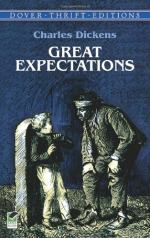There were some people slinking about as usual when we passed out into the street, who were evidently anxious to speak with him; but there was something so conclusive in the halo of scented soap which encircled his presence, that they gave it up for that day. As we walked along westward, he was recognized ever and again by some face in the crowd of the streets, and whenever that happened he talked louder to me; but he never otherwise recognized anybody, or took notice that anybody recognized him.
He conducted us to Gerrard-street, Soho, to a house on the south side of that street. Rather a stately house of its kind, but dolefully in want of painting, and with dirty windows. He took out his key and opened the door, and we all went into a stone hall, bare, gloomy, and little used. So, up a dark brown staircase into a series of three dark brown rooms on the first floor. There were carved garlands on the panelled walls, and as he stood among them giving us welcome, I know what kind of loops I thought they looked like.
Dinner was laid in the best of these rooms; the second was his dressing-room; the third, his bedroom. He told us that he held the whole house, but rarely used more of it than we saw. The table was comfortably laid — no silver in the service, of course — and at the side of his chair was a capacious dumb-waiter, with a variety of bottles and decanters on it, and four dishes of fruit for dessert. I noticed throughout, that he kept everything under his own hand, and distributed everything himself.
There was a bookcase in the room; I saw, from the backs of the books, that they were about evidence, criminal law, criminal biography, trials, acts of parliament, and such things. The furniture was all very solid and good, like his watch-chain. It had an official look, however, and there was nothing merely ornamental to be seen. In a corner, was a little table of papers with a shaded lamp: so that he seemed to bring the office home with him in that respect too, and to wheel it out of an evening and fall to work.




